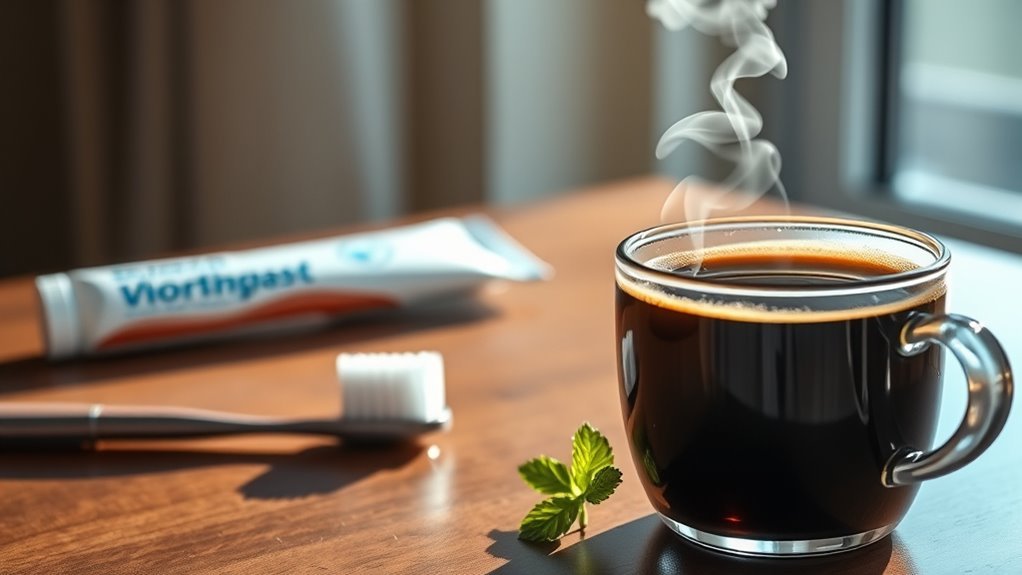Can Coffee Give You Bad Breath
Yes, coffee can give you bad breath. It reduces saliva flow, leading to a dry mouth that encourages odor-causing bacteria. The acidity of coffee also alters saliva’s ability to neutralize odors. Add to that any sugar or creamers you might use, and you increase bacteria growth. Staying hydrated and maintaining good oral hygiene can help, but there are also some effective strategies and alternatives to contemplate. There’s more to discover about keeping your breath fresh despite your coffee habit!
Understanding Halitosis: What Causes Bad Breath?

When you think about bad breath, or halitosis, it’s easy to assume that it’s simply a result of what you eat, but the reality is much more complex. Various bad breath triggers can contribute to this common issue, ranging from poor oral hygiene to underlying health conditions. For instance, dry mouth can lead to an increase in odor-causing bacteria, while certain foods like garlic and coffee can temporarily exacerbate the problem. It’s essential to maintain oral health awareness, as regular brushing, flossing, and dental check-ups can help combat bad breath. Understanding the multifaceted causes of halitosis empowers you to take control of your oral health, ensuring you feel confident and free from the worry of unpleasant breath in social situations.
The Role of Oral Bacteria in Halitosis
Although you might not realize it, oral bacteria play an essential role in the development of halitosis. Your oral microbiome consists of diverse bacteria, some beneficial and others harmful. When there’s an imbalance in this bacterial balance, bad breath can emerge. Harmful bacteria break down food particles, releasing volatile sulfur compounds that contribute to unpleasant odors. Maintaining a healthy oral microbiome is crucial for fresh breath. Regular brushing, flossing, and hydration help keep these bacteria in check. Additionally, being mindful of your diet, including limiting sugary foods, can support a balanced bacterial environment. By understanding the role of oral bacteria, you can take proactive steps to combat halitosis and enjoy greater freedom in social interactions.
How Coffee Affects Saliva Production

When you sip on that morning coffee, you might not realize it’s affecting your saliva production. Research shows that caffeine can reduce saliva flow, leaving your mouth drier than usual. Plus, the acidity of coffee can further impact your oral environment, making it a double whammy for fresh breath.
Saliva Flow Reduction
While many people enjoy their morning cup of coffee for its energizing effects, it can inadvertently lead to reduced saliva flow. This decrease in saliva can affect your mouth’s overall health and moisture levels. Here are three ways coffee impacts saliva production:
- Dehydration: Caffeine’s diuretic properties can lead to lower hydration, which may reduce saliva output.
- Saliva Composition: Coffee’s acidity can alter saliva composition, affecting its ability to neutralize harmful bacteria.
- Oral Moisture: Less saliva means less oral moisture, creating a dry environment that can promote bad breath.
Maintaining adequate saliva flow is essential for oral health, so consider balancing your coffee intake with plenty of water to keep your mouth fresh and moisture-rich.
Acidity Impact on Oral
The acidity of coffee plays a significant role in how it affects saliva production and overall oral health. High coffee acidity can lead to a drop in saliva flow, which is essential for maintaining a balanced oral environment. When your saliva levels decrease, it can result in dry mouth and increased bacteria growth, contributing to bad breath. Additionally, the acidic nature of coffee can erode enamel over time, creating further dental issues. To counteract these effects, consider drinking water alongside your coffee to help neutralize acidity and stimulate saliva production. By being mindful of coffee acidity, you can enjoy your favorite brew while still prioritizing your oral health. So, stay hydrated and keep your smile fresh!
The Impact of Coffee’s Acidity on Oral Health
Although many people savor their morning cup of coffee for its rich flavor and energizing effects, its acidity can take a toll on your oral health. Here are three ways coffee acidity affects your mouth:
- Enamel Erosion: The acidic nature of coffee can wear down tooth enamel, leading to increased sensitivity and a higher risk of cavities.
- Gum Irritation: Regular exposure to acidic beverages can irritate your gums, potentially causing inflammation and discomfort.
- pH Imbalance: Coffee’s acidity can disrupt the natural pH balance in your mouth, promoting harmful bacteria that contribute to bad breath.
Dehydration and Its Connection to Bad Breath

When you drink coffee, you might not realize it can lead to dehydration, which often causes dry mouth. A lack of saliva can allow bacteria to thrive, resulting in bad breath. Staying properly hydrated is essential for maintaining fresh breath and overall oral health.
Dry Mouth Effects
Have you ever noticed that your breath smells worse after sipping coffee? That’s likely due to dry mouth, a common effect of caffeine. When your mouth lacks moisture, bacteria thrive, leading to bad breath. Here are three reasons why dry mouth can be problematic:
- Reduced saliva production – Saliva helps wash away food particles and bacteria.
- Increased bacteria growth – A dry environment is perfect for bacteria to multiply.
- Altered taste perception – You might crave stronger flavors, leading to more coffee consumption.
To combat dry mouth, consider these dry mouth remedies and hydration tips: drink water regularly, chew sugar-free gum, and avoid excessive caffeine. Staying hydrated is essential for fresh breath and overall health!
Hydration Importance
Staying hydrated plays an essential role in maintaining fresh breath. When you’re dehydrated, your saliva production decreases, leading to a dry mouth that can foster bad breath. Saliva is nature’s way of rinsing away food particles and bacteria, so low water intake can directly contribute to odor. To combat this, explore various hydration methods like infusing water with fruits or herbal teas. Aim for at least eight cups a day, but adjust based on your activity level and climate. Remember, sipping water throughout the day is more effective than gulping it all at once. By prioritizing hydration, you not only enhance your overall health but also keep unpleasant breath at bay, giving you the freedom to speak confidently.
The Effect of Coffee on Your Oral Ph Balance
Although many people enjoy coffee for its rich flavor and stimulating effects, it can have a significant impact on your oral pH balance. Here’s what you should know about coffee consumption and its effects:
- Acidity: Coffee is naturally acidic, which can lower your oral pH, creating an environment conducive to bacteria growth.
- Dehydration: Caffeine can lead to dry mouth, reducing saliva production, which is crucial for maintaining a balanced pH.
- Erosion: Frequent acidity can erode enamel over time, increasing sensitivity and risk of cavities.
Maintaining a favorable oral pH is essential for fresh breath and overall oral health. Be mindful of your coffee intake and consider ways to counteract its effects to keep your mouth balanced and healthy.
The Influence of Additives: Sugar and Creamers

When you add sugar and creamers to your coffee, you not only change its flavor but also influence your breath and oral health. Sweeteners impact the way bacteria flourish in your mouth. Sugars can create a sticky environment, encouraging the growth of odor-causing bacteria. This can lead to bad breath, especially if you don’t maintain proper oral hygiene. Additionally, creamers, often rich in fats and sugars, can contribute to plaque buildup, further exacerbating the issue. While those delightful coffee flavors might tempt you, it’s essential to recognize how these additives can transform your overall coffee experience. Balancing your love for sweetened coffee with mindful consumption can help you enjoy your brew without the unwanted side effects on your breath.
Strategies for Minimizing Bad Breath After Coffee
To keep bad breath at bay after your coffee fix, staying hydrated is vital. Opting for better additives can also make a difference, as some sweeteners and creamers may contribute to odor. Plus, maintaining good oral hygiene is fundamental to guarantee your mouth feels fresh and clean.
Hydration Is Key
While you might love your morning cup of coffee, staying hydrated is essential for keeping bad breath at bay. Here are three strategies to enhance your hydration habits:
- Drink Water Before Your Coffee: Start your day with a glass of water to get your water intake on track and combat dryness.
- Alternate Sips: While enjoying your coffee, take sips of water in between. This helps flush out potential odor-causing bacteria.
- Opt for Hydrating Foods: Incorporate fruits and veggies with high water content, like cucumbers or oranges, to boost your hydration levels.
Choose Your Additives
Hydration alone isn’t the only factor in keeping bad breath at bay after your morning brew. Choosing the right additives can make a significant difference. While flavored options might tempt you, some can exacerbate bad breath due to sugar and dairy content. Consider the health impacts these additives may have on your breath and overall wellness.
Here’s a quick guide to help you choose wisely:
| Additive | Bad Breath Potential |
|---|---|
| Sugar | High |
| Creamer | Medium |
| Cinnamon | Low |
| Almond Milk | Low |
| Sugar-Free Syrup | Medium |
Opt for low-impact choices to savor your coffee guilt-free. Your breath will thank you!
Maintain Oral Hygiene
Maintaining good oral hygiene is essential if you want to keep bad breath at bay after enjoying your coffee. Here are three strategies to help you freshen up:
- Toothbrush Technique: Make sure you’re using the right toothbrush technique. Brush for at least two minutes, focusing on your tongue and the crevices of your teeth, where coffee residue hides.
- Mouthwash Selection: Choose a mouthwash with antibacterial properties to combat odor-causing bacteria. Look for one that’s alcohol-free to avoid drying out your mouth.
- Stay Hydrated: Drink plenty of water throughout the day to help wash away coffee particles and keep your mouth moist, which is vital for preventing bad breath.
Alternatives to Coffee for a Fresh Breath Boost
Have you ever wondered what alternatives to coffee can keep your breath fresh without the potential drawbacks? Herbal teas, like peppermint or chamomile, are excellent choices. They not only hydrate but also help neutralize bad odors thanks to their natural properties. Mint alternatives, such as chewing fresh mint leaves or using mint-infused water, can instantly rejuvenate your palate. These options are not only enjoyable but also provide a vibrant burst of flavor without the acidity of coffee. Plus, they encourage hydration, which is key for maintaining fresh breath. So, if you’re looking for a way to enjoy a revitalizing boost without the coffee breath, consider these delightful alternatives. Your breath—and your taste buds—will thank you!
Maintaining Oral Hygiene as a Coffee Lover

While sipping your favorite cup of coffee can be a delightful ritual, it’s essential to pay attention to your oral hygiene to combat any unintended consequences. Here are three tips to keep your breath fresh:
- Stay Hydrated: Drink plenty of water throughout the day. This helps rinse away food particles and reduces dry mouth, which can worsen bad breath.
- Use Breath Fresheners: Incorporate sugar-free mints or chewing gum after your coffee. These can stimulate saliva production and mask any lingering odors.
- Explore Coffee Alternatives: Try herbal teas or matcha, which can provide an energizing boost without the same breath issues.
Frequently Asked Questions
Can Coffee Consumption Worsen Existing Bad Breath Issues?
If you’re wondering whether coffee consumption can worsen existing bad breath issues, it’s important to take into account factors like coffee acidity and mouth dryness. Coffee can lead to dry mouth, which reduces saliva that helps wash away bacteria. This dryness, combined with coffee’s acidity, might exacerbate any bad breath problems you already have. Staying hydrated and balancing your coffee intake can help alleviate these effects while still enjoying your favorite brew.
Does Drinking Coffee Affect the Taste of Breath Fresheners?
Imagine sipping a vibrant cup of coffee, like a painter mixing their palette. When you reach for breath fresheners afterward, the coffee’s acidity can interfere with their effectiveness. Studies show that the strong flavors and acidity might mask or alter the taste of these fresheners, leaving you with a less-than-refreshing experience. So, if you’re enjoying your coffee, wait a bit before reaching for that minty boost to keep your breath truly fresh!
Are Certain Coffee Types Less Likely to Cause Bad Breath?
When you’re choosing your coffee, certain types might be less likely to cause bad breath. Cold brew, for example, is often smoother and less acidic, which can lead to a more pleasant post-drink experience. On the other hand, espresso roast tends to be richer and more concentrated, potentially leading to stronger odors. So, if you’re concerned about breath, opting for cold brew could be a smart choice to enjoy your coffee without the worry!
How Long After Drinking Coffee Can Bad Breath Occur?
When it comes to bad breath, you might find that time flies after you drink coffee. Typically, bad breath can kick in within 30 minutes to an hour, largely due to coffee’s acidity and its effect on your hydration levels. If you’re not drinking enough water, the compounds in coffee may linger longer, contributing to foul breath. Staying hydrated can help keep your breath fresh and minimize any unpleasant aftereffects.
Can Bad Breath From Coffee Be Permanent?
Bad breath from coffee typically isn’t permanent. While coffee can contribute to dry mouth and odor, these effects are usually temporary. If you’re concerned about long-term solutions, staying hydrated and maintaining good oral hygiene can help. Regular brushing, flossing, and using mouthwash can combat any lingering odors. It’s important to address any underlying issues, so you can enjoy your coffee without worrying about lasting effects on your breath.






